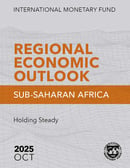This web page provides information on the activities of the Office, views of the IMF staff, and the relations between Ethiopia and the IMF. Additional information can be found on the Ethiopia and IMF country page, including official IMF reports and Executive Board documents in English that deal with Ethiopia.
At a Glance
- Current IMF membership: 191 countries
- Ethiopia joined the Fund in December 27, 1945
- Total Quotas: SDR 300.70 Million
- Article IV/Country Report: January 28, 2020 IMF Country Report No. 20/29
Office Activities
Contextualizing Ethiopia’s Recent Economic Performance
Keynote Address by Abebe Aemro Selassie, Director, African Department, IMF at the Ethiopian Economics Association’s 17th International Conference on the Ethiopian Economy.
July 18, 2019
G20 Compact with Africa Peer Learning Workshop on Private Sector-Led Diversification and Growth
Remarks by Abebe Aemro Selassie, Director, African Department, IMF Addis Ababa, Ethiopia
July 17, 2019
Regional Economic Outlook for Sub-Saharan Africa and Macroeconomic Issues for Ethiopia
Presentation by the IMF Resident Representative to development partners and private sector representatives
November 1, 2013
IMF's Work on Ethiopia
No results found. Either there was an error with the web service or there is no data returned by the web service.
Regional Economic Outlook
October 16, 2025

The outlook for Sub-Saharan Africa is showing resilience, despite a challenging external environment with uneven prospects in commodity prices, still tight borrowing conditions, and a deterioration of the global trade and aid landscape.
Read the Report
Departmental Papers on Africa
 The Departmental African Paper Series covers research on sub-Saharan Africa conducted by International Monetary Fund (IMF) staff, particularly on issues of broad regional or cross-country interest. The views expressed in these papers are those of the author(s) and do not necessarily represent the views of the IMF, its Executive Board, or IMF Management.
The Departmental African Paper Series covers research on sub-Saharan Africa conducted by International Monetary Fund (IMF) staff, particularly on issues of broad regional or cross-country interest. The views expressed in these papers are those of the author(s) and do not necessarily represent the views of the IMF, its Executive Board, or IMF Management.



